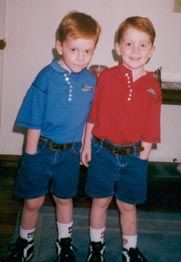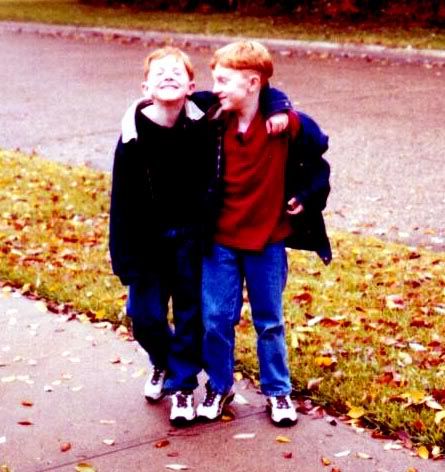 To read the tribute to SFC Marcus Muralles, please click here
To read the tribute to SFC Marcus Muralles, please click here 
Saturday, July 09, 2005
I Could Have Told You That
Researchers have spent tons of money studying identical twins, and they've reached the same conclusions that any parent of identical twins could have told you for a lot less cash. What is this snippet of knowledge that has elluded the scientific community until now?
Identical twins are not all that identical.
First, I guess I need to provide my credentials to prove I'm an expert, right? Well, here:
T1 (in blue) and T2 when they were about 3

The boys at age 8 or 9 (T1 on left)
They look identical to me! Granted, I've never had their DNA tested- I don't think I really need to. Given their looks, and some specific mirror qualities, I'm pretty confident that they're identical. (More on that later...)
Now, on to our "news".
A lot of the studies done on identical twins concentrate on twins that grew up separated from each other at birth (or shortly after.)
But then there are the very identical (well mirror) things about them. Their hair parts on opposite sides. They lost their baby teeth in the same order, but on opposite sides (it makes sense if you think about it). They each had an "extra tooth" over their front teeth that had to be removed (on opposite sides, but it's still very rare- kind of freaked out their dentist).
There was one thing in the article that caught me off guard, although, after I thought about it, it makes perfect sense.
But, this makes me wonder. How much do the average singleton's genomes change throughout one's life? How many mutations do our bodies experience in the course of our days? Which ones are pre-programed, and which ones are caused by circumstance? What can we learn from this?
I understand the "need" for research like this- it helps scientists determine nature/nurture (in a lot of cases) and it helps look at genetic predispositions for some diseases. All I'm saying is that parents of identical twins could have told you most of that for the price of a phone call.
Identical twins are not all that identical.
First, I guess I need to provide my credentials to prove I'm an expert, right? Well, here:

T1 (in blue) and T2 when they were about 3

The boys at age 8 or 9 (T1 on left)
They look identical to me! Granted, I've never had their DNA tested- I don't think I really need to. Given their looks, and some specific mirror qualities, I'm pretty confident that they're identical. (More on that later...)
Now, on to our "news".
Identical twins are not quite as identical as once thought, according to a new study of DNA.I actually know of one set of identical twins (DNA test to prove it) where the twins had different color hair and eyes. That mutation occured before they were born. As for my own person research subjects... T2 used to get migraines (I cannot say enough wonderful things about the fine folks at Austin Childrens' Hospital- they fixed him!) and T1 never got them. T1 has a weird allergy that affects his eye, but T2 has standard issue respiratory allergies. And personality? They are very different.
Life, it seems, changes everyone in unique ways.
One twin might get cancer while the the other is not susceptible, for example. Many identical twins clearly behave differently as they grow older, and some even grow to look less alike.
Such differences have to do not with the twins' identical DNA, which is the software of life, but in how genes express themselves, the research found. The differences stem from chemical modifications in the genes over the years.
These epigenetic effects, as they are called, are the result of chemical exposure, dietary habits and other environmental factors, the scientists believe.
A lot of the studies done on identical twins concentrate on twins that grew up separated from each other at birth (or shortly after.)
In 2001, scientists documented that identical twins with different diets had corresponding differences in blood cholesterol measures. A study in 2002 found that identical twins tend to differ greatly in their levels of emotional distress, depending on how close each was to their mother or whether they attended church, among other social factors.But, I can see a lot of the same differences between T1 and T2, and, well... they're always together. Same food, same caregivers, etc. Because of T2's migraines, he didn't eat as much as T1 for a few months (any of you with migraines understand completely), and he's never really caught up. He's about an inch shorter than T1, and about 15 pounds lighter. T1 has a much more cautious personality (I'm resisting the urge to say "more responsible"- Iguess it's a first born thing, even if it was just over a minute's difference). T2 is far more "jump off the cliff then check for a parachute". (That goes back to when they were babies- T1 just sat there and watched T2 fall all over the place, trying to walk. Once T2 had figured it out, T1 just got up and walked. From what I could tell, he was learning from his brother's mistakes.) T1 is pretty reserved, pretty quiet, and T2 is... not. They even sound different on the phone.
But then there are the very identical (well mirror) things about them. Their hair parts on opposite sides. They lost their baby teeth in the same order, but on opposite sides (it makes sense if you think about it). They each had an "extra tooth" over their front teeth that had to be removed (on opposite sides, but it's still very rare- kind of freaked out their dentist).
There was one thing in the article that caught me off guard, although, after I thought about it, it makes perfect sense.
The youngest set of twins had the most identical genomes. Genetically, the oldest twins were the least alike.Like I said, it makes sense. The boys were very close to identical when they were babies (I kept T2's ankle bracelet from the hospital on for as long as possible, just to tell them apart). But, as they've gotten older, little differences become more obvious. (Right now, their size difference makes it pretty easy to tell them apart.) So, I can see how their genomes will alter even more over time.
But, this makes me wonder. How much do the average singleton's genomes change throughout one's life? How many mutations do our bodies experience in the course of our days? Which ones are pre-programed, and which ones are caused by circumstance? What can we learn from this?
I understand the "need" for research like this- it helps scientists determine nature/nurture (in a lot of cases) and it helps look at genetic predispositions for some diseases. All I'm saying is that parents of identical twins could have told you most of that for the price of a phone call.


